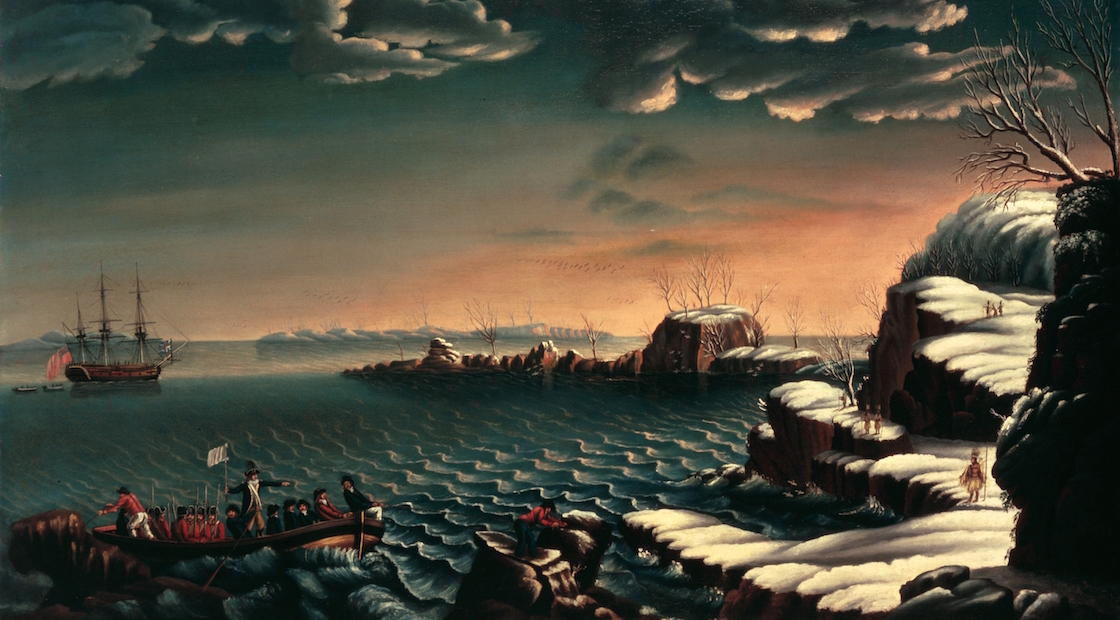The Pilgrims in Their Own Words
Our nation is in crisis. Our times are troubled. Our national memory has grown dim. We need to remember who we are. Thanksgiving is a perfect time for this. Take a few moments this holiday to ponder the words of our Pilgrim Fathers about their First Thanksgiving. It may be a first step toward recovering who we are meant to be.
***
- In 1608, the Pilgrims left England for Holland to escape persecution by the Anglican Church. William Bradford, the Pilgrim’s chronicler and long-time governor, wrote that they had “as the Lord’s free people, joined themselves by a covenant of the Lord into a church estate, in the fellowship of the Gospel, to walk in all His ways made known…unto them, according to their best endeavors, whatsoever it should cost them, the Lord assisting them.”
- While preaching to his exiled congregation in Holland, Pastor John Robinson preached of his vision for the New World: “Now as the people of god in old time were called out of Babylon civil, the place of their bodily bondage, and were to come to Jerusalem, and there to build the Lord’s temple, or tabernacle…so are the people of God now to go out of Babylon spiritual to Jerusalem…and to build themselves as lively stones into a spiritual house, or temple, for the Lord to dwell in.”
- After 12 years living in Holland, the Pilgrims began to nurture a desire to take the Gospel to remote parts of the world. Bradford writes of their passion to reach the new world: “…a great hope and inward zeal they had of laying some good foundation, or at least to make some way thereunto, for the propagating and advancing the gospel of the kingdom of Christ in those remote parts of the world; yea, though they should be but even as stepping-stones unto others for the performing of so great a work.”
- They were carefully counting the cost: “…all great and honorable actions are accompanied with great difficulties, and must be enterprise and overcome with answerable courages. It was granted that the dangers were great, but not desperate, and the difficulties were many, but not invincible…and all of them, through the help of God, fortitude and patience, might either be borne or overcome…[But] their condition was not ordinary. Their ends were good and honorable, their calling lawful and urgent, and therefore they might expect the blessing of God in their proceeding; yea, though they should lose their lives in this action, yet they might have comfort in the same, and their endeavors would be honorable.”
- They were willing to face hardship: “Yea, and as the enterprise is weighty and difficult, so the honor is more worthy, to plant a rude wilderness, to enlarge the honor and fame of our dread sovereign, but chiefly to display the efficacy and power of the Gospel, both in zealous preaching, professing, and wise walking under it, before the faces of these poor blind infidels.”
- They were particularly concerned for the conversion of natives in the New World: “And first, seeing we daily pray for the conversion of the heathens…it seemeth unto me that we ought also to endeavor and use the means to convert them; and the means cannot be used unless we go to them, or they come to us. To us they cannot come, our land is full; to them we may go…that they may be persuaded at length to embrace the Prince of Peace, Christ Jesus, and rest in peace with him forever.”
- After making arrangements for the voyage, their pastor, John Robinson, called a “day of sollemme humiliation.” Robinson preached from Ezra 8:21: “And there at the river, by Ahavba, I proclaimed a fast, that we might humble ourselves before our God and seek of him a right way for us, and for our children and for all our substance.” Robinson later wrote, “The rest of the time was spent in powering out prayers to the Lord with great fervencies, mixed with abundance of tears.”
The majority left Holland to board their ships in England. Their godly pastor, John Robinson, stayed behind to care for the elderly and infirm. He sent a letter with one of the leaders that was to be read as they boarded their ships. The words would repeatedly provide comfort and encouragement to them as their adventure unfolded.
- As they prepared to leave in 1620,“they knew they were pilgrims, and looked not much on those things, but lifted up their eyes to the heavens, their dearest cuntrie, and quieted their spirits.”
- The voyage on The Mayflower lasted 66 days. The ship was no longer than a volleyball court and the storms they sailed through sometimes laid the ship on its side, sometimes threw it high in the air only to slam it upon the water again. During that time of year the North Atlantic waters are so cold that the U.S. Navy estimates a man will live only three minutes if he falls overboard.
- For weeks at a time, the Pilgrims were forced to remain in the “tween decks.” One sailor repeatedly called them “psalmsinging pukestockings.” They suffered all the effects of being tossed on the ocean for over two months — men, children, pregnant women, the elderly — but they always harbored in their hearts an earnest desire to be a “stepping stone of the light of Christ in a new land.”
- When they arrived, landing in a howling wilderness, Bradford wrote these moving words: “Being thus passed the vast ocean, and a sea of troubles before in their preparation they had now no friends to welcome them, nor inns to entertain or refresh their weatherbeaten bodys, no houses or much less townes to repair too, to seeke for succoure. And for the season it was winter, and they that know the winters of that cuntrie know them to be sharp and violent, and subject to cruel and fierce storms, dangerous to travel to known places, much more to search an unknown coast. Besides, what could they see but a hideous and desolate wilderness, full of wild beasts and wild men? And what multitudes there might be of them they knew not. What could now sustain them but the spirite of God and his grace? May not and ought not the children of these fathers, rightly say: ‘Our fathers were Englishmen which came over this great ocean, and were ready to perish in this wilderness.’”
- Because they had been blown off course by the storms and had not landed upon the land of their charter, the Pilgrims wrote a new charter, called the Mayflower Compact. It is the first binding covenant or constitution in American history. It states clearly why they sailed to the new world.
But this unity was quickly challenged. Bradford wrote:
In these hard and difficult beginnings they found some discontents and murmurings arise among some, and mutinous speeches and carriages in other, but they were soon quelled and overcome by the wisdom, patience, and just and equal carriage of things by the Governor and better part, which clave faithfully together in the main. But that which was most sad and lamentable was, that in 2 or 3 months time halfe of their company dyed, especially in January and February, being the depth of winter, and wanting houses and other comforts, being infected with the scurvie and other diseases, and which this long voyage and their inaccomodate condition had brought upon them; so as there dyed some time 2 or 3 a day in the foresaid time; that of 100 persons, scarce 50 reminded.
And of these in the time of most distress, there were but 6 or 7 sound persons who, to their great commendations be it spoken, spared no pains, night or day, but with abundance of toyle and hazard of their own health, fetched them wood, made them fires, dressed them meat made their beds, washed their loathsome clothes, clothed and unclothed them, in a word did all the homely and necessary offices for them which dainty and queasy stomachs cannot endure to hear named; and all this willingly and cheerfully without any grudging in the least, showing herein their true love unto their friends and brethren.
- Still, God’s grace was sufficient. English-speaking Indians named Samoset and Squanto helped the Pilgrims learn how to farm the land and harvest the bay. Squanto lived with the Pilgrims until 1622 when he died. His last request was that Gov. William Bradford would pray that he might go to the Englishman’s God in heaven. Bradford wrote: “Squanto continued with them and was their interpreter, and was a special instrument sent of God for their good beyond their expectation. He directed them how to set their corn, where to take fish and to procure other commodities and was also their pilot to bring them to unknown places for their profit, and never left them till he dyed.”
- Their next harvest proved the wisdom of Squanto. They had abundance of food for the first time. Governor Bradford called for a Day of Thanksgiving.
_____________________________________
Quotes from Speeches
about the Pilgrims and Thanksgiving
“Let us, in the midst of these reflections, have our hearts enlarged in thanksgiving to God, for his merciful favor to our fathers, and to us by their instrumentality. Let us piously acknowledge the hand of God, in all that has been done for them and us, and to the whole, cry grace, grace. With what strange gloom are our hearts filled, when we make the supposition that all our fathers had been left to perish in their attempt! Proportionable to the dreadfulness of such a supposition, let our gratitude be, to our father’s God and our’s. And, out of gratitude to God, let us improve the blessings of life with sobriety, and maintain our liberties with an honorable Christian firmness.”
Charles Turner, 1773
“…let us not forget the religious character of our origin. Our fathers were brought hither by their high veneration for the Christian religion. They journeyed by its light, and labored in its hope. They sought to incorporate its principles with the elements of their society, and diffuse its influence through all their institutions, civil, political, or literary. Let us cherish these sentiments, and extend this influence still more widely; in full conviction, that that is the happiest society which partakes in the highest degree of the mild and peaceful spirit of Christianity.”
Daniel Webster, 1851
“Thus out of small beginnings greater things have been produced by His hand that made all things of nothing, and gives being to all things that are; and as one small candle may light a thousand, so the light here kindled hath shone to many, yea in some sort to our whole nation; let the glorious name of Jehovah have all the praise.”
William Bradford, Of Plimoth Plantation




